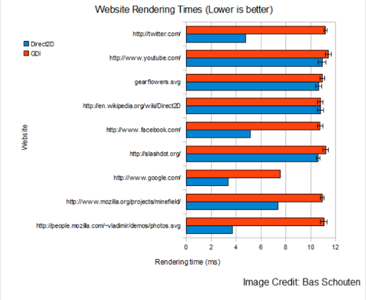Microsoft announced Internet Explorer 9 at its Professional Developers Conference earlier this month. One of the unique features of IE9 that Microsoft announced at that time was hardware acceleration for its browser. Thanks to technologies like Direct2D and Direct Write that are available for Windows7, Windows developers can use a computer’s graphics card to render websites faster. While Microsoft is still working on this project behind closed doors, however, you can already download a Direct2D-enabled pre-release version of Firefox 3.7 today.

Beyond JavaScript: Fast Browsers Thanks to Direct2D
Ever since the release of Google’s Chrome, browser developers have emphasized JavaScript performance. There is still a lot of work left to be done in this area, but developers have also started to investigate other parts of the browser that could benefit from new technologies.
According to Firefox developer Bas Schouten, the current implementation of Direct2D in this pre-release version will work best with graphics cards that support DirectX10 and WDDM1.0 drivers. On systems that fulfill these specs, though, users are likely to see significantly better performance on graphics-heavy sites. Sites that mostly render static text or depend on Adobe Flash to display their graphics won’t benefit greatly from Direct2D. One benefit of Direct2D that users will notice on most sites, however, is improved font rendering.

For the time being, this is just an experiment and it isn’t clear if Mozilla will integrate this technology into Firefox 3.7. What is clear, is that Mozilla seems to be ahead of Microsoft and by doing its development out in the open and through open source, Mozilla will be able to rely on its vast developer community to test and enhance these features.
What About Google and Apple?
Some would argue that the release of Google Chrome started this new race towards faster browsers, and as CNet’s Stephen Shankland pointed out earlier today, the Chrome development team is quite aware of Mozilla’s efforts and investigating the use of hardware acceleration in Chrome as well. As Shankland also notes, these Direct2D efforts shouldn’t be confused with other projects like WebGL or Google’s Native Client. Direct2D-enabled browsers will be able to render current pages faster, while these other technologies will require developers to redesign their sites.
Currently, a lot of these experiments are mostly focused on Windows. With OpenCL in Snow Leopard, Apple already offers a programming interface for using graphics cards for general-purpose computing. Apple is probably also looking at OpenCL to speed up Safari, though we aren’t aware of any projects from Mozilla or Google that are making use of OpenCL at this point.
Get it Now
If you feel like experimenting with a new browser, you can download an early pre-release of an alpha version of Firefox 3.7 here. While we have tested this browser for a while and didn’t see any crashes, it is worth remembering that this version isn’t meant to be run in a production environment and that most of your extensions will likely not work.










